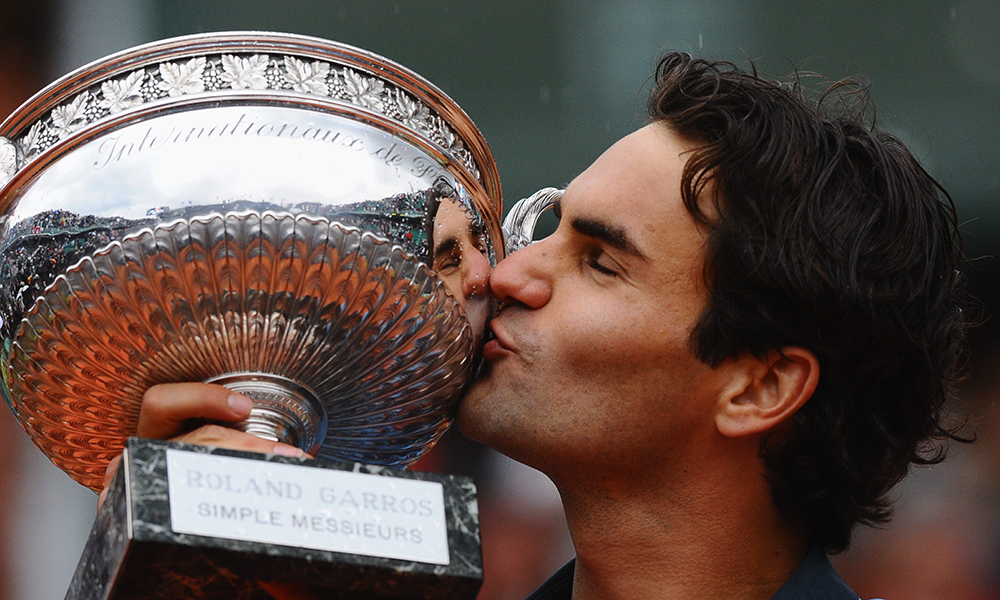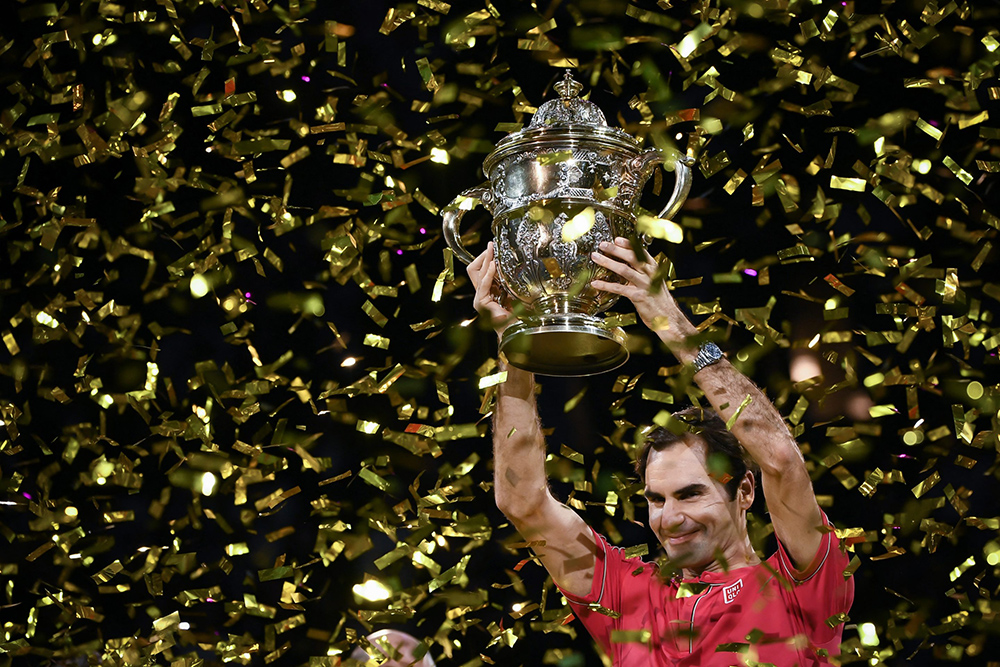
早在《挑戰者》(Challengers)將網球變成隱喻之前,羅杰·費德勒就從這項運動中學習人生經驗。他在達特茅斯學院(Dartmouth College)最新一屆畢業生的畢業演講中傳授了許多人生經驗。該演講如今在網上走紅。
他開玩笑說:“畢業生們,我對你們的痛苦感同身受。我知道當人們不斷問你下半輩子有什么打算時是什么感覺。”盡管離開了職業球場,費德勒仍在分享他在球場上學到的智慧。
這位剛剛退役的明星運動員在2000年代成為家喻戶曉的人物,連續237周蟬聯ATP單打冠軍(后被打破)。他不僅從勝利中收獲了很多經驗,也從失敗中吸取了很多教訓,他將自己長達數十年的職業生涯歸納為三條主要經驗,供2024屆畢業生參考。
不費吹灰之力是個神話
費德勒說冷靜是一種習得的技能,就像朱莉婭·羅伯茨(Julia Roberts)說每位紅發人士都是通過使用盒裝染料染發才能獲得一頭紅發一樣。盡管名聲在外,但費德勒在青少年時期也是個急性子,他描述了自己如何努力控制脾氣,從而看起來不那么煩躁。
很多人說他打球毫不費力,這讓他很生氣。他堅持認為,不努力就不會取得成功。
他說:“事實上,竭盡全力才能看起來毫不費力。在我學會保持冷靜之前,我花了好幾年的時間抱怨、咒罵......扔球拍。”
費德勒指出,即使他的父母和教練指責他,他的態度也只是在對手公開承認他的行為后才有所改變。
他的對手說:“羅杰在前兩個小時是最受歡迎的,之后我就是最受歡迎的了。”在職業生涯早期,費德勒感到很困惑。但他說自己逐漸明白了其中的含義。當你感到精神煥發的時候,打出好成績既簡單又容易;后來,當你的意志消退、身體疲憊的時候,那時的表現才真正重要。
“這讓我明白,我還有很多工作要做。”他表示,并解釋說,他訓練的目的就是為了獲得這樣的聲譽,因為他意識到“不費吹灰之力取勝才是最終成就”。
將這一點與畢業班聯系起來,費德勒問他們有多少次看到同齡人不費吹灰之力就取得好成績。“希望你們能像我一樣,明白不費吹灰之力只是一個神話。我取得今天的成就,并非僅憑天賦,而是通過努力超越對手才實現的。”
費德勒承認“天賦很重要”,但他說這不是與生俱來的。在生活和網球運動中,“天賦并不重要,重要的是勇氣”。
只是一分而已
費德勒承認,無論你在比賽中付出多少汗水和淚水,都有可能無緣獎杯。
他最大的失利是2008年的溫布爾登網球錦標賽,當時他正為實現歷史性的成就而戰:六連冠。費德勒記得,他一度認為自己的對手拉菲爾·納達爾(Rafael Nadal,贏得22個大滿貫男子單打冠軍)比他更渴望奪冠。就在那時,比賽結束了。盡管他在最后一刻增強了信心,但這“來得太晚了”,他還是輸了。費德勒還記得有人說這是他職業生涯的終點。

即使這是一場不朽的比賽,但也只是他職業生涯中的一個小插曲。費德勒說:“在網球運動中,完美是無法實現的。雖然他在一段時間內都是佼佼者,但還是經常失誤。費德勒指出,在1526場單打比賽中,他有80%場獲勝,但只拿到總分的54%。
平均而言,錯失每一分都會讓費德勒“學會不要糾結于每一次擊球”,包括他里程碑式的勝利和失敗。當然,每一分你都要全力以赴,但一旦完成,再糾結也沒有用。他補充說,讓過去成為過去,可以讓你把一切都投入到每一刻或每一分上。
他說:“事實上,無論你在生活中玩什么游戲,有時你都會輸掉一分、一場比賽、一個賽季或丟掉一份工作。開始懷疑自己、自怨自艾再正常不過了。但負能量就是在浪費能量。”
正是在這些艱難時刻,才造就了真正的贏家:“世界上最優秀的人之所以是最優秀的,并不是因為他們贏得了每一分,而是因為他們知道自己會一敗再敗。”
生活比球場更重要
費德勒解釋說,球場畢竟很小,只比宿舍大一點。盡管他在那里建立了自己的生活,但他知道生活中還有比網球世界更重要的東西。
費德勒說他的生活很有意義,“被旅行、文化、友誼,尤其是家庭填滿”。在環游世界的同時,他轉而投身慈善事業,創建了一個基金會,旨在普及早期兒童教育。
盡管當時他只有22歲,覺得自己可能還太年輕,不應涉足網球以外的領域,但他還是抓住機會,成立了羅杰·費德勒基金會,并發現自己的旅程收獲頗豐。費德勒指出,慈善不僅僅是捐錢,還包括奉獻思想和時間,他敦促畢業生們跳出舒適區,接受新觀念。
他補充說:“你們每個人都有很多東西可以奉獻,我希望你們能找到自己獨特的方式來改變現狀,因為生活的范疇確實要比球場大得多。”(財富中文網)
譯者:中慧言-王芳
早在《挑戰者》(Challengers)將網球變成隱喻之前,羅杰·費德勒就從這項運動中學習人生經驗。他在達特茅斯學院(Dartmouth College)最新一屆畢業生的畢業演講中傳授了許多人生經驗。該演講如今在網上走紅。
他開玩笑說:“畢業生們,我對你們的痛苦感同身受。我知道當人們不斷問你下半輩子有什么打算時是什么感覺。”盡管離開了職業球場,費德勒仍在分享他在球場上學到的智慧。
這位剛剛退役的明星運動員在2000年代成為家喻戶曉的人物,連續237周蟬聯ATP單打冠軍(后被打破)。他不僅從勝利中收獲了很多經驗,也從失敗中吸取了很多教訓,他將自己長達數十年的職業生涯歸納為三條主要經驗,供2024屆畢業生參考。
不費吹灰之力是個神話
費德勒說冷靜是一種習得的技能,就像朱莉婭·羅伯茨(Julia Roberts)說每位紅發人士都是通過使用盒裝染料染發才能獲得一頭紅發一樣。盡管名聲在外,但費德勒在青少年時期也是個急性子,他描述了自己如何努力控制脾氣,從而看起來不那么煩躁。
很多人說他打球毫不費力,這讓他很生氣。他堅持認為,不努力就不會取得成功。
他說:“事實上,竭盡全力才能看起來毫不費力。在我學會保持冷靜之前,我花了好幾年的時間抱怨、咒罵......扔球拍。”
費德勒指出,即使他的父母和教練指責他,他的態度也只是在對手公開承認他的行為后才有所改變。
他的對手說:“羅杰在前兩個小時是最受歡迎的,之后我就是最受歡迎的了。”在職業生涯早期,費德勒感到很困惑。但他說自己逐漸明白了其中的含義。當你感到精神煥發的時候,打出好成績既簡單又容易;后來,當你的意志消退、身體疲憊的時候,那時的表現才真正重要。
“這讓我明白,我還有很多工作要做。”他表示,并解釋說,他訓練的目的就是為了獲得這樣的聲譽,因為他意識到“不費吹灰之力取勝才是最終成就”。
將這一點與畢業班聯系起來,費德勒問他們有多少次看到同齡人不費吹灰之力就取得好成績。“希望你們能像我一樣,明白不費吹灰之力只是一個神話。我取得今天的成就,并非僅憑天賦,而是通過努力超越對手才實現的。”
費德勒承認“天賦很重要”,但他說這不是與生俱來的。在生活和網球運動中,“天賦并不重要,重要的是勇氣”。
只是一分而已
費德勒承認,無論你在比賽中付出多少汗水和淚水,都有可能無緣獎杯。
他最大的失利是2008年的溫布爾登網球錦標賽,當時他正為實現歷史性的成就而戰:六連冠。費德勒記得,他一度認為自己的對手拉菲爾·納達爾(Rafael Nadal,贏得22個大滿貫男子單打冠軍)比他更渴望奪冠。就在那時,比賽結束了。盡管他在最后一刻增強了信心,但這“來得太晚了”,他還是輸了。費德勒還記得有人說這是他職業生涯的終點。
即使這是一場不朽的比賽,但也只是他職業生涯中的一個小插曲。費德勒說:“在網球運動中,完美是無法實現的。雖然他在一段時間內都是佼佼者,但還是經常失誤。費德勒指出,在1526場單打比賽中,他有80%場獲勝,但只拿到總分的54%。
平均而言,錯失每一分都會讓費德勒“學會不要糾結于每一次擊球”,包括他里程碑式的勝利和失敗。當然,每一分你都要全力以赴,但一旦完成,再糾結也沒有用。他補充說,讓過去成為過去,可以讓你把一切都投入到每一刻或每一分上。
他說:“事實上,無論你在生活中玩什么游戲,有時你都會輸掉一分、一場比賽、一個賽季或丟掉一份工作。開始懷疑自己、自怨自艾再正常不過了。但負能量就是在浪費能量。”
正是在這些艱難時刻,才造就了真正的贏家:“世界上最優秀的人之所以是最優秀的,并不是因為他們贏得了每一分,而是因為他們知道自己會一敗再敗。”
生活比球場更重要
費德勒解釋說,球場畢竟很小,只比宿舍大一點。盡管他在那里建立了自己的生活,但他知道生活中還有比網球世界更重要的東西。
費德勒說他的生活很有意義,“被旅行、文化、友誼,尤其是家庭填滿”。在環游世界的同時,他轉而投身慈善事業,創建了一個基金會,旨在普及早期兒童教育。
盡管當時他只有22歲,覺得自己可能還太年輕,不應涉足網球以外的領域,但他還是抓住機會,成立了羅杰·費德勒基金會,并發現自己的旅程收獲頗豐。費德勒指出,慈善不僅僅是捐錢,還包括奉獻思想和時間,他敦促畢業生們跳出舒適區,接受新觀念。
他補充說:“你們每個人都有很多東西可以奉獻,我希望你們能找到自己獨特的方式來改變現狀,因為生活的范疇確實要比球場大得多。”(財富中文網)
譯者:中慧言-王芳
Long before Challengers turned tennis into a metaphor, Roger Federer used his sport as a way into learning life’s lessons. He imparted a number of them to Dartmouth College’s latest graduating class in what has now become a viral commencement speech.
“Graduates, I feel your pain. I know what it’s like when people keep asking what your plan is for the rest of your life,” he joked. But even though he’s left the professional courts, Federer is sharing the wisdom he learned from his time on the grass.
The newly retired star athlete became a household name in the 2000s, spending a (since broken) record 237 consecutive weeks as the No. 1 in singles tennis by the ATP. He’s gleaned a lot not just from his wins but also from his defeats, as he breaks down his decades-long career into three main takeaways for the class of 2024.
Effortless is a myth
Federer saying calmness is a learned skill is not unlike Julia Roberts saying every redhead is a box dye. But despite his reputation, Federer was a hothead as a teenager and describes his attempts to rein it in and seem unbothered.
Describing his being bristled by many people saying his playing was effortless, he insists that no success comes without trying.
“The truth is I had to work very hard to make it look easy,” he said. “I spent years whining, swearing … throwing my rackets before I learned to keep my cool.”
Federer noted that even with his parents and coaches calling him out, his attitude only changed when one of his opponents publicly recognized his behavior.
“Roger will be the favorite for the first two hours, then I’ll be the favorite after that,” his opponent said. Still early in his career, Federer was confused. But he describes coming to understand the meaning. Doing well when you’re feeling fresh is simple and easy; it’s later on when your resolve fades and your body gets tired that the performance really matters.
“It made me understand I have so much work ahead of me,” he said, explaining that he trained to get that collected reputation as he realized “winning effortlessly is the ultimate achievement.”
Relating it back to the graduating class, Federer asks how often they saw their peers get good grades without putting much of a sweat in. “Hopefully like me, you learn that effortless is a myth. I didn’t get where I got [by] pure talent alone. I got there by trying to outwork my opponents,” he continued.
Federer recognized “talent matters,” but said it’s not an innate thing. In life and in tennis, “not about having a gift, it’s about having grit.”
It’s only a point
No matter how much sweat and tears you put into a game, you can still walk away sans trophy, Federer acknowledges.
His biggest loss was the 2008 Wimbledon tournament, where he was playing to reach a historical achievement: six consecutive titles. At one point, Federer remembers thinking his opponent—Rafael Nadal, who’s won 22 Grand Slam men’s singles titles—was hungrier than he was. That’s when the game was over. Even though he had a last-minute boost of confidence, it “came too late,” and he lost. Federer remembers how some people suggested that it was the end of his career.
But even though it was a monumental game, it really was only a blip in his career. “In tennis, perfection is impossible,” Federer said. While he was top dog for a stretch of time, he still whiffed a lot. Federer noted he won 80% of his 1,526 singles matches, but only 54% of all points.
On average, missing every second point made Federer “learn not to dwell on every shot,” including his milestone wins and losses. Of course, you bring everything you have into each point, but once it’s done then it’s no use lingering. And letting the past stay in the past allows you to put everything into each moment or point, he added.
“The truth is, whatever game you play in life, sometimes, you’re going to lose a point, a match, a season, a job,” he said. “It’s natural when you’re down to doubt yourself, and to feel sorry for yourself. But negative energy is wasted energy.”
It’s in those hard times that a real winner is made: “The best in the world are not the best because they win every point. It’s because they know they’ll lose again and again.”
Life is bigger than the court
A court is small after all, only a bit bigger than a dorm room, Federer explained. Even though that’s where he built his life, he knew there was more to life than the world of tennis.
Federer said he’s had “a rewarding life full of travel, culture, friendships, and especially family.” While traveling the world, he turned to philanthropy and created a foundation toward making early-childhood education more accessible.
Though he was just 22 years old at the time, feeling perhaps he was too young to dive into anything beyond tennis, he took a chance, launched the Roger Federer Foundation, and found his journeys immensely rewarding. Noting that philanthropy is not just about donating money, but also ideas and time, Federer urged graduates to look outside their own bubbles they’ve built as well.
“All of you have so much to give, and I hope you will find your own unique ways to make a difference, because life really is much bigger than the cort,” he added.






